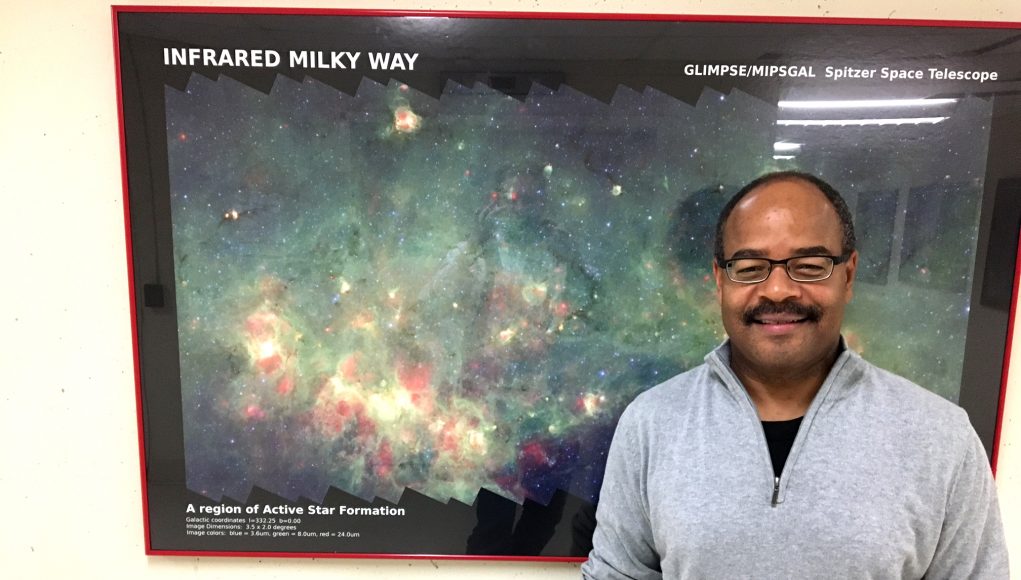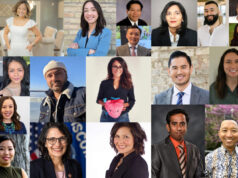 “My parents got me a telescope when I was 8 years old and I got hooked on astronomy at an early age,” remembers Eric Wilcots, associate dean for natural and mathematical sciences in the UW-Madison College of Letters & Science. “I grew up in Philadelphia — in the city — so there were only a good four stars in the night sky. But I was still hooked early.
“My parents got me a telescope when I was 8 years old and I got hooked on astronomy at an early age,” remembers Eric Wilcots, associate dean for natural and mathematical sciences in the UW-Madison College of Letters & Science. “I grew up in Philadelphia — in the city — so there were only a good four stars in the night sky. But I was still hooked early.
“And the [NASA] Voyager mission to Jupiter a little later … that really got me hooked,” Wilcots continues. “There was a spacecraft going around Jupiter and for about a week these pictures were coming back and I was like, ‘WOW! Those guys look like they’re having fun and that was cool!’”
I tell Wilcots I was first intrigued by astronomy doing an elaborate report on planet Pluto in the second grade. “Ooooh. You’ve heard, haven’t you? They’ve demoted Pluto,” Wilcots laughs.
Astronomy has been a life passion for Wilcots, a full professor in the Department of Astronomy at UW-Madison and he loves to share that passion with others. “Astronomy is great because kids just love it. There are particular types of science like astronomy and paleontology – what kid doesn’t like a good dinosaur? – where you can get that curiosity dialed up early,” Wilcots tells Madison365. “And if you can sustain that curiosity, all the better. And that’s what science festivals are all about. Hooking people with their curiosity: How does that particular thing work? Why does that drink fizz? Why is that thing that color? Asking those kinds of questions and getting a few answers but keeping that curiosity going. If we can sustain that through middle school and high school and into college, then we are all in better shape.”
Curiosity will once again be dialed up at the 200-plus events of the 2016 Wisconsin Science Festival Oct. 20-23 that will feature something for everyone. Wilcots is once again serving on the steering committee for the event, now in its 6th year, that continues to get bigger and better with activities spanning 34 cities and towns in Wisconsin.
“Over the last few years of the festival there has been a real emphasis on branching out throughout the state,” Wilcots says. “So no matter wherever you are throughout the state, you should be able to find something interesting with the Wisconsin Science Festival.”
Science, technology, engineering and math (STEM) fields have been historically, and even today, very white and very male. Wilcots agrees that it’s important for young people to see scientists that look like them. “Seeing somebody that looks like them helps them envision that it is possible,” says Wilcots, an active member of the National Society of Black Physicists, one of the most highly placed African-American astrophysicists in the country and a force for inclusiveness on campus. “That’s one reason I think [astrophysicist, cosmologist, author] Neil deGrasse Tyson is so important. He’s just fantastic.”

(Photo courtesy of Wisconsin Alumni Research Foundation)
Like Tyson, Wilcots often teaches through storytelling and it draws non-science majors to popular astronomy courses. “Science is a story. When I’m giving a talk to the general public or to my classes, it is a story,” Wilcots says. “A class I’m teaching this semester, for example, is called ‘History of the Matter in the Universe.’ It is a story of the elements that you and I are made of, that the rocks are made of. Where do those come from? Yes, it’s scientific, but we start with the very beginning of the universe and we are weaving our way through this story.
“Science is a process and a story by which we have come to learn some things and we know some things about how things work. But there is much that we don’t know,” adds Wilcots, who obtained his bachelor’s degree at Princeton University in 1987 and Ph.D. from the University of Washington in 1992.
Does Wilcots ever just sit back and think about how amazing it is the amount we have learned about the universe over humankind and how equally amazing it is the amount we have left to learn? “Oh, yeah. Oh, yeah. All the time. One of the amazing things is our ability as human beings trying to understand how the universe works on all scales. It is stunning what we do know.
We’ve landed things on moving comments – which is unbelievable. We know a little something about how the universe works, but there’s a lot that we do not know. And that’s true of all sciences.”

Pondering all of the things possible in the universe is what Wilcots hopes people continue to do at the Universe in the Park, one of his favorite programs that he has adopted. Universe in the Park is predicated on a simple idea — the best place to introduce the general public to astronomy is outside under dark skies and every weekend from the end of May through October in a state park like Devil’s Lake, Willow River, Copper Falls, or Kettle Moraine, community members can participate free of charge. Wilcots has helped lead dozens of astronomy graduate and undergraduates students in expanding the program to reach every state park in Wisconsin – and some state forests – that have naturalist programs.
“We sent letters to every state park and we offered it to everyone in the state in ’95-’96 and it’s been going strong ever since,” Wilcots says. “We send a couple of graduate students with telescopes to state parks. They will give a little talk and then set the telescopes to whatever is interesting in the night sky. It’s really cool. Some summers we are really lucky. Earlier this summer, for example, you had Saturn, you had Jupiter, you had Mars all up at the same time. Other summers, not so lucky.”
Universe in the Park fits in well with Wilcot’s research which broadly focuses on understanding the evolution of individual galaxies and galaxy groups primarily through observations at radio wavelengths. Particular topics include Magellanic-type spirals, the evolution of the gas content of galaxy groups, radio AGN, and the evolution of the interstellar medium in groups.
Astronomy will be a big part of the upcoming Wisconsin Science Festival that will explore science from every possible angle. “We have a lot of things going on this year,” Wilcots says. “Our steering committee meetings are a roundtable of all the various things going on and we are very excited for the upcoming festival.”

(Photo courtesy of Wisconsin Alumni Research Foundation)
Some of the Wisconsin Science Festival highlights will include:
“Science Arcade Night” is a new Madison featured event showcasing the science, technology, engineering, math and, of course, the fun behind vintage arcade games, virtual reality like those on VRToday Magazine, multi-player games and more.
Big Ideas Amazing Students — State Capitol: This event provides an opportunity to interact with K-12 students from around the state as they share their projects or discoveries connected to the science of health, wellness and/or metabolism. Students will display their poster boards, exhibits and materials.
Big Ideas for Busy People: Back for a third year at the Wisconsin Science Festival, Big Ideas for Busy People features some of the UW’s best and brightest highlight their groundbreaking work — covering topics ranging from fossils to supernovas and from virtual reality to real-life politics in Wisconsin. Each speaker gives a five-minute talk followed by five minutes of Q & A.
“If they want to get a quick snapshot of some really cool things that people are doing, Big Ideas for Busy People is a great venue for doing that,” Wilcots says. “Last year, we had people somebody talking about the universe, somebody talking about humanoids in Africa. We had one of our engineers talking about some really neat stuff with cameras that can peer around corners. We had somebody talking about politics. You get the whole suite of everything we do in really short talks – kinda like TED talks.”
There’s a lot going on at the 2016 Wisconsin Science Festival and Wilcots says that you won’t want to miss it. “This is fun. I get to go to a few science festivals and let me tell you that the ‘festival’ part of it is accurate,” Wilcots says. “The idea is people will have fun and, by the way, they’re actually going to learn something along the way.
“But don’t be scared about that,” Wilcots adds, laughing. “The other thing that we try to convey is that even if you aren’t thinking about it, there is science in almost everything you do. Your cellphone – there’s an awful lot of science that goes into your cellphone. If you order a cappuccino, there’s an awful lot of science in that foaming of that drink, roasting those coffee beans. Where do those suds come from when you are washing dishes? Lots of science there.
“Science is everywhere and the Festival makes it very accessible,” he adds. “There are moments there for everybody. It’s great for kids. They are so curious. You want kids to ask ‘Why?’ It’s important to be curious.”










